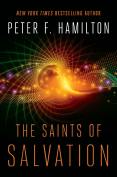The concluding book of the Salvation Sequence tells two stories. One is of the “Saints”, who pass into the Olyix Enclave of slow time, and send their signal to humanity. Ten thousand years later, the Exodus Humans attack the enclave. Since times moves much more slowly inside, only a few weeks have passed for the Saints. And that’s just the beginning of the mind-mending time-warping. Yirella’s neutron star civilisation also manipulates time, allowing its inhabitants to live thousands of years whole only a few decades pass outside.
While the Exodus Humans are evolved, they are still quite recognizably like their forebears, the Corpus Humans of the neutron star are something else entirely, extending their consciousness in multiple bodies. This brings about uncomfortable questions around the similarity to Olyix minds. Could the humans be evolving into the very thing that they are fighting?
The entire third volume is a triumphant climax to a finely crafted story, with multiple, complex storylines scattered across thousands of years. The first two books introduced the effects of concepts of portals, wormholes and time manipulation on the story. The third book takes it all to the next level, challenging the reader to follow along on a wild ride through time and space. The temporal-spatial scale and scope of the story are stupendous, but it always comes down to individual characters making important and sometimes heartbreaking choices.










